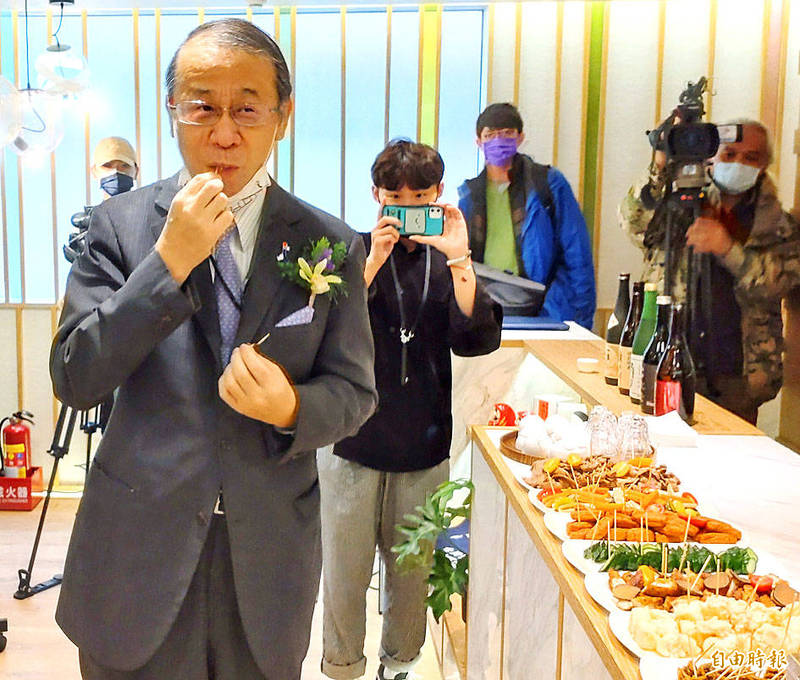《TAIPEI TIMES》 MT says import ban lift an ‘attack’

Japan-Taiwan Exchange Association Representative Hiroyasu Izumi tastes Japanese food at the Pop Up Fukushima event in Taipei on Nov. 26 last year. Photo: Yang Cheng-yu, Taipei Times
JAPANESE FOOD: KMT Chairman Eric Chu said that the Democratic Progressive Party would ‘pay the price’ for defying public opinion and ignoring public health
By Chen Yun, Yang Chun-hui and Kayleigh Madjar / Staff reporters, with staff writer and CNA
The Chinese Nationalist Party (KMT) yesterday accused the government of launching a “surprise attack” in defiance of public opinion by lifting a ban on food imports from five Japanese prefectureds without consulting opposition parties or the public.
At a news conference at the Legislative Yuan in Taipei, KMT caucus whip William Tseng (曾銘宗) called on people to use their votes this year to oppose the “tyrannical, arrogant and detestable” administration.
With its decision to allow food imports from the prefectures, after they were banned following the nuclear disaster at the Fukushima Dai-ichi plant in 2011, the administration is “trampling on the will of 7.79 million Taiwanese” who in 2018 voted in a referendum to uphold the ban, Tseng said.
Lifting the ban would not help Taiwan join the Tokyo-led Comprehensive and Progressive Agreement for Trans-Pacific Partnership (CPTPP), as the Japan-Taiwan Exchange Association has already made it clear that the two issues are not linked, he said.
Other KMT legislators questioned the rigor of certification procedures and resources available, given a relatively meager NT$20 million (US$718,442) increase in the Food and Drug Administration’s import inspection budget and limited nuclear testing laboratories, with only seven in Taiwan.
Although he did not attend the news conference, KMT Chairman Eric Chu (朱立倫) earlier on Facebook said that the Democratic Progressive Party (DPP) would “pay the price” for defying public opinion and ignoring public health.
“No party is entitled to tear up the result” of the 2018 referendum, Chu wrote, adding that the KMT would unfailingly oppose dangerous “nuclear food.”
DPP spokeswoman Hsieh Pei-fen (謝佩芬) said that the result of implementing last year’s referendum on pork imports showed public support for the idea that Taiwan, as an eager participant in global trade organizations, should abide by international standards and scientific evidence.
Hsieh also rejected that the decision was a “surprise attack,” citing former president Ma Ying-jeou’s (馬英九) 2016 call to end the ban.
As for the 2018 referendum, Hsieh said that the government has adopted every proposal put forward by the public, including six risk assessment procedures and expanded testing capacity.
Taiwan People’s Party caucus whip Chiu Chen-yuan (邱臣遠) told a separate news conference that the party does not oppose lifting the ban, as there is clear communication and labeling, and adequate management of imports.
However, Chiu criticized the DPP’s use of the term “Fukushima food” in place of “nuclear food,” calling it a deliberate tactic to obscure the topic.
The Taiwan Statebuilding Party said that the KMT had used oversimplified terms such as “nuclear food” and “ractopamine pork” to mislead the public and rile populist sentiment.
Taiwan cannot stand apart from the world and must join the CPTPP, it said.
The New Power Party said that the government’s ability to manage food safety has been called into question for a long time.
Before allowing imports from the five prefectures, the administration must present results of its risk assessment and inspections, ban risky products and adhere to high import standards, the New Power Party said.
Japan-Taiwan Exchange Association Representative Hiroyasu Izumi said he was “gratified” by the decision and pledged that Tokyo would never sell Taipei products that bore a health risk.
“Each and every Japanese resident in those areas is even more gratified than me,” Izumi said, adding that Taiwanese can now enjoy Japanese peaches, strawberries and other products, despite being unable to travel overseas during the COVID-19 pandemic.
In Tokyo, Japanese Minister of Foreign Affairs Yoshimasa Hayashi confirmed that the Japanese government had received official notification that the ban would be lifted and that it would officially respond when it has more details.
Additional reporting by Hsieh Chun-lin and Yang Cheng-yu
新聞來源:TAIPEI TIMES
















